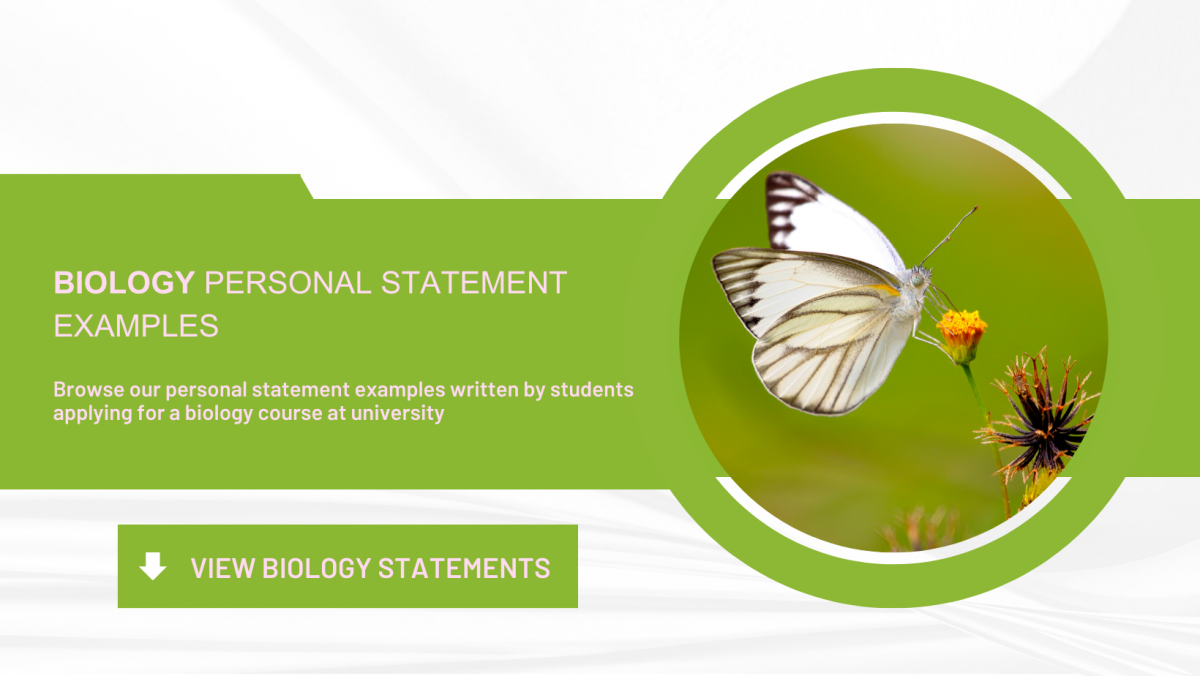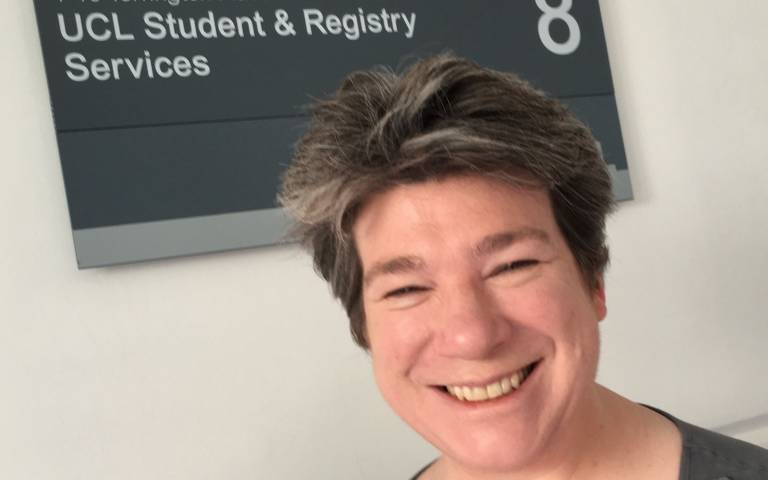Applied in: Winter 2013
University offers: imperial college, king's college, ucl, bath, york.
Two years ago, when an expert from the French National Centre for Scientific Research gave us a presentation of her works in molecular biology during our optional class of Scientific Exploration, it struck me that whilst planets, galaxies and space exert a profound fascination for most people, we can explore an equally complex universe through the lens of a microscope. We have so much to learn from cells, DNA and genes, no need to look so far away into larger notions that are literally beyond our full comprehension. Since we started studying in depth the general theme of biological sciences in class, I cannot see which other subject could fascinate me to the point of being ready to spend at least the next five years of my life studying it, especially the notions linked to genetics. Understanding how little fragments of acid combine to make a human being happen is incredible, and the lessons based on a mixture of documents, software and observation to infer about how events such as the synthesis of proteins or the transmission of a specific gene happen are especially stimulating. The only aspect of these lessons I dislike is my teacher always starting to explain some complex aspect of the topic then interrupting himself because "it's not on the syllabus", and it is by furthering my studies in this domain that I plan to satisfy my unanswered curiosity.
Reading through Eberhard Passarge's "Colour Atlas of Genetics" has already offered me some deeper knowledge of more complex genetic subjects, principally the transition from a gene to a protein. Discovering that this process which seemed so simple was divided into three precise steps (transcription, splicing and translation) in eukaryotic cells sparked my interest. Furthermore, the absence of splicing in prokaryotic cells surprised me since we do not refer to these cells in our lessons, I ignored the possible differences between the genetic mechanisms of eukaryotic and prokaryotic cells. Understanding that this difference was explained by the absence of introns in the latter's genes led to more interrogations which I have yet not been able to answer. I hope in a few years to be able to answer all the questions I ask myself by becoming a researcher specialised in genetics, or to use the use the knowledge I will have acquired to contribute to forensic investigations.
Apart from genetics, the main interests I have in biological sciences are the organisation and structure of cells, as well as the actions they are able to undertake. These subjects are actually all linked together, since the genes code the proteins which in turn affect a particular function of the cell, the latter then able to play a specific role in the organism. The fact that our body integrates this complex internal micrometric structure which dictates its conduct is just plainly fascinating. Studying genetics can therefore give me a better comprehension of cellular biology and vice-versa, my two main interests hence closely related in their learning.
My two main extra scholar hobbies are badminton and cinema. I've been practicing the former for a few years now, and find it especially helpful to clear my head from the pressure of exams whilst having a good time with friends every week and staying healthy. The latter is a more recent interest which I undertake when time is available to open my mind to different concepts, or simply to occasionally take a break from reality during an hour and a half.
The desire for understanding is my first, strongest motivation to enrol myself in a course related to genetics. I truly believe university will offer me the knowledge I seek in this topic especially, and complete it with other information relevant to the theme of biological sciences.
Please note UCAS will detect any form of plagiarism. PSE and its contributors do not take any responsibility for the way in which personal statements are used.
- Applying to Uni
- Apprenticeships
- Health & Relationships
- Money & Finance
Personal Statements
- Postgraduate
- U.S Universities
University Interviews
- Vocational Qualifications
- Accommodation
- Budgeting, Money & Finance
- Health & Relationships
- Jobs & Careers
- Socialising
Studying Abroad
- Studying & Revision
- Technology
- University & College Admissions
Guide to GCSE Results Day
Finding a job after school or college
Retaking GCSEs

In this section
Choosing GCSE Subjects
Post-GCSE Options
GCSE Work Experience
GCSE Revision Tips
Why take an Apprenticeship?
Applying for an Apprenticeship
Apprenticeships Interviews
Apprenticeship Wage
Engineering Apprenticeships
What is an Apprenticeship?
Choosing an Apprenticeship
Real Life Apprentices
Degree Apprenticeships
Higher Apprenticeships
A Level Results Day 2024
AS Levels 2024
Clearing Guide 2024
Applying to University
SQA Results Day Guide 2024
BTEC Results Day Guide
Vocational Qualifications Guide
Sixth Form or College
International Baccalaureate
Post 18 options
Finding a Job
Should I take a Gap Year?
Travel Planning
Volunteering
Gap Year Blogs
Applying to Oxbridge
Applying to US Universities
Choosing a Degree
Choosing a University or College
Personal Statement Editing and Review Service
Clearing Guide
Guide to Freshers' Week
Student Guides
Student Cooking
Student Blogs
- Top Rated Personal Statements
Personal Statement Examples
Writing Your Personal Statement
- Postgraduate Personal Statements
- International Student Personal Statements
- Gap Year Personal Statements
Personal Statement Length Checker
Personal Statement Examples By University
- Personal Statement Changes 2025
- Personal Statement Template
Job Interviews
Types of Postgraduate Course
Writing a Postgraduate Personal Statement
Postgraduate Funding
Postgraduate Study
Internships
Choosing A College
Ivy League Universities
Common App Essay Examples
Universal College Application Guide
How To Write A College Admissions Essay
College Rankings
Admissions Tests
Fees & Funding
Scholarships
Budgeting For College
Online Degree
Platinum Express Editing and Review Service
Gold Editing and Review Service
Silver Express Editing and Review Service
UCAS Personal Statement Editing and Review Service
Oxbridge Personal Statement Editing and Review Service
Postgraduate Personal Statement Editing and Review Service
You are here
- Mature Student Personal Statements
- Personal Statements By University
- Accountancy and Finance Personal Statements
- Actuarial Science Personal Statements
- American Studies Personal Statements
- Anthropology Personal Statements
- Archaeology Personal Statements
- Architecture Personal Statements
- Art and Design Personal Statements
- Biochemistry Personal Statements
- Bioengineering Personal Statements
- Biology Personal Statements
- Biomedical Science Personal Statements
- Biotechnology Personal Statements
- Business Management Personal Statement Examples
- Business Personal Statements
- Catering and Food Personal Statements
- Chemistry Personal Statements
- Classics Personal Statements
- Computer Science Personal Statements
- Computing and IT Personal Statements
- Criminology Personal Statements
- Dance Personal Statements
- Dentistry Personal Statements
- Design Personal Statements
- Dietetics Personal Statements
- Drama Personal Statements
- Economics Personal Statement Examples
- Education Personal Statements
- Engineering Personal Statement Examples
- English Personal Statements
- Environment Personal Statements
- Environmental Science Personal Statements
- Event Management Personal Statements
- Fashion Personal Statements
- Film Personal Statements
- Finance Personal Statements
- Forensic Science Personal Statements
- Geography Personal Statements
- Geology Personal Statements
- Health Sciences Personal Statements
- History Personal Statements
- History of Art Personal Statements
- Hotel Management Personal Statements
- International Relations Personal Statements
- International Studies Personal Statements
- Islamic Studies Personal Statements
- Japanese Studies Personal Statements
- Journalism Personal Statements
- Land Economy Personal Statements
- Languages Personal Statements
- Law Personal Statement Examples
- Linguistics Personal Statements
- Management Personal Statements
- Marketing Personal Statements
- Mathematics Personal Statements
- Media Personal Statements
- Medicine Personal Statement Examples
- Midwifery Personal Statements
- Music Personal Statements
- Music Technology Personal Statements
- Natural Sciences Personal Statements
- Neuroscience Personal Statements
- Nursing Personal Statements
- Occupational Therapy Personal Statements
- Osteopathy Personal Statements
- Oxbridge Personal Statements
- Pharmacy Personal Statements
- Philosophy Personal Statements
- Photography Personal Statements
- Physics Personal Statements
- Physiology Personal Statements
- Physiotherapy Personal Statements
- Politics Personal Statements
- Psychology Personal Statement Examples
- Radiography Personal Statements
- Religious Studies Personal Statements
- Social Work Personal Statements
- Sociology Personal Statements
- Sports & Leisure Personal Statements
- Sports Science Personal Statements
- Surveying Personal Statements
- Teacher Training Personal Statements
- Theology Personal Statements
- Travel and Tourism Personal Statements
- Urban Planning Personal Statements
- Veterinary Science Personal Statements
- Zoology Personal Statements
- Personal Statement Editing Service
- Personal Statement Writing Guide
- Submit Your Personal Statement
- Personal Statement Questions 2025
Biology Personal Statement Examples

What is a biology personal statement?
Your biology personal statement should tell the university all about your strengths, skills, experience and career plans.
It should also convey your enthusiasm for the subject, and what aspects of it you enjoy and why.
How do I write a biology personal statement?
It’s a good idea to start your statement with why you want to study biology at university.
Try to talk about what drew you to biology initially - was it a childhood experience, or were you inspired by a family member or a television documentary? Pin this down if you can, as admissions tutors always want to know about your motivations for wanting to study their subject.
Make sure you back up everything with examples, as you need to convince the university that you they should offer you a place on their biology degree over anyone else.
A great biology personal statement should be written clearly and concisely, with a good introduction, middle, and a conclusion. After all, your statement has to stand out from the crowd if your UCAS application is going to be successful.
For inspiration on how to write your own unique statement, take a look at some of our engineering personal statement examples above, as well as our collection of top rated personal statement examples .
What should I include in my biology personal statement?
It’s important to include skills and experience from all areas of your life and try to relate them to hobbies or extracurricular activities if they helped you to build on certain strengths.
Think about how any work experience you have completed might be useful in your degree, e.g. what skills did you learn? were there any parts of it you particularly enjoyed? if so, why?
Make sure you include everything that is relevant to your course, which means you may want to leave off your Grade 6 in piano, or your swimming certificates.
University admissions tutors want to know what you can bring to their department and what value you can add, so every sentence of your personal statement needs to earn its place.
You need to sell yourself as a well-rounded individual in terms of academic knowledge, work experience and extracurricular activities in order to have a chance of being successful with your biology UCAS application (although this doesn't mean lying or embellishing the truth!).
For more help and advice on what to write in your biology personal statement, please see:
- Personal Statement Editing Services
- Personal Statement Tips From A Teacher
- Analysis Of A Personal Statement
- The 15th January UCAS Deadline: 4 Ways To Avoid Missing It
- Personal Statement FAQs
- Personal Statement Timeline
- 10 Top Personal Statement Writing Tips
- What To Do If You Miss The 15th January UCAS Deadline.
Related resources
Getting into ecology.

Find out more
UCAS Tariff Points Explained

A Level Results Day


Guidance from our top admission experts — for free!

- Admit Finder
Discover Past Admits, Gauge Your Chances!
- Shortlist Builder
Personalized University Picks, Just a Click Away.
- Course Finder
Navigate Global Courses Tailored for You
- Scholarship Finder
Unlock Funding Opportunities Worldwide.

Get tailored study abroad advice.

Sign in for exclusive content!

Planning to study abroad?

Build your target shortlist and see your odds of getting into top schools with Ambitio's AI shortlist builder!

Heading Out Already?
Our Ivy League mentors and top admission experts can help with personalized tips to get you into your dream school
6 minutes read
Crafting an Outstanding UCL Personal Statement: A Comprehensive Guide with Examples
Dirghayu Kaushik
29 August 2024

Gaining admission to University College London (UCL) is a dream for many, but achieving this goal requires more than just academic excellence.
Your UCL personal statement plays a pivotal role in your application, serving as a unique opportunity to showcase your aspirations, achievements, and individuality.
This article provides essential insights and examples to assist you in creating a personal statement that captures the essence of your academic and personal journey, tailored to resonate with UCL’s admissions committee.
Worried about the cost of Studying Abroad?
Sign up to access 25 game-changing scholarships that could cover your costs.
- The Role of a Personal Statement in Your UCL Application
Understanding the Significance
Your personal statement is a critical element of your UCAS application to UCL. It’s your chance to convey your enthusiasm, experiences, and suitability for your chosen course.
This narrative helps the admissions team to understand who you are beyond your grades and test scores. It’s about making a compelling case for why you are an ideal candidate for UCL and how the university fits into your academic and career aspirations.
What UCL Looks For
UCL, being a prestigious and competitive institution, seeks candidates who demonstrate intellectual curiosity, a commitment to their field of study, and the potential to contribute meaningfully to the university community.
Your personal statement should reflect these qualities, showcasing your passion for learning, your understanding of the course content, and your readiness for the challenges of university life.
Stuck on How to Pick Your Ideal College?
Sign up to access your tailored shortlist and simplify finding your ideal college.
- Crafting a Winning Personal Statement for UCL
Creating a personal statement for University College London (UCL) is a crucial step in your application process. Your statement should stand out, reflecting your unique qualifications and enthusiasm for your chosen course. Here are key points to help you craft a winning personal statement for UCL:
- Understand UCL’s Values and Course Requirements : Before you begin, research UCL’s ethos, values, and specific requirements for your chosen course. Understanding what UCL looks for in its students can help tailor your statement to resonate with the admissions committee.
- Start with a Compelling Introduction : Your opening lines should grab the reader’s attention. Start with a personal anecdote, a provocative question, or a statement that clearly expresses your passion for the subject.
- Showcase Your Academic Strengths : Highlight your academic achievements that are relevant to the course. Include any awards, high grades in related subjects, or participation in relevant academic competitions or projects.
- Demonstrate Interest and Knowledge in the Subject : Show that you have a deep understanding of and a genuine interest in the field. Discuss any books, articles, or research that have inspired you and shaped your desire to study this subject at UCL.
- Reflect on Relevant Experiences : Include work experience, internships, volunteering, or extracurricular activities that have helped develop skills and qualities relevant to the course. Explain what you learned from these experiences and how they have prepared you for university-level study.
- Discuss Your Career Aspirations : Clearly articulate how the course at UCL fits into your long-term career goals. This shows admissions tutors that you have a clear direction and motivation for your studies.
- Exhibit Your Skills and Qualities : Highlight personal skills and qualities that make you a suitable candidate for the course. These might include problem-solving, critical thinking, leadership, teamwork, or communication skills.
- Explain Why UCL Is the Right Choice for You : Discuss specific aspects of UCL and its course offerings that appeal to you. This could be particular modules, the teaching methodology, research opportunities, or the campus environment.
- Make It Personal and Authentic : Your statement should be personal and reflect your true self. Avoid clichés and generic statements. Admissions tutors want to hear your voice and understand who you are.
- Conclude with a Strong Closing Statement : End your personal statement on a high note, reemphasizing your enthusiasm and readiness for the course and how you look forward to contributing to the UCL community.
- Proofread and Edit : Ensure your statement is free of grammatical errors and typos. A well-written, error-free statement demonstrates your attention to detail and commitment to excellence.
- Seek Feedback : Before finalizing, get feedback from teachers, mentors, or those who know you well. They can provide valuable insights and help you refine your statement.
By following these points, you can craft a personal statement that not only meets the standards of UCL but also truly represents your academic ambitions and personal journey, significantly boosting your chances of admission.
See how Successful Applications Look Like!
Access 350K+ profiles of students who got in. See what you can improve in your own application!
- Personal Statement Examples for Different UCL Courses
Example of UCL Medicine Program
Medicine applicants need to demonstrate a passion for the field, empathy, and a strong academic background in sciences. An effective personal statement for a UCL medicine course might begin with a personal anecdote or experience that sparked your interest in medicine.
Follow this with details of your academic journey in sciences, any relevant work experience, and extracurricular activities. Conclude by discussing your career aspirations in medicine and how UCL’s program aligns with these goals.
Example for UCL Economics Program
For an economics course, your statement should reflect your understanding of economic principles and your ability to think critically about economic issues. Start by explaining why you are interested in economics, possibly by citing a current issue or personal experience.
Include your academic achievements in mathematics and related subjects, and any relevant extracurricular activities, like participating in economics clubs or competitions. Finally, express how UCL’s economics program will help you achieve your career objectives.

Start Your University Applications with Ambitio Pro!
Get Ambitio Pro!
Begin your journey to top universities with Ambitio Pro. Our premium platform offers you tools and support needed to craft standout applications.
Unlock Advanced Features for a More Comprehensive Application Experience!

Start your Journey today
Key Dos and Don’ts in Writing Your Personal Statement
- Final Steps Before Submission
Review and Feedback
Before submitting your personal statement, it’s crucial to review it thoroughly. Seek feedback from teachers, mentors, or peers who can provide constructive criticism. Their insights can help refine your statement, ensuring it’s compelling and error-free.
Aligning Your Statement with UCL’s Values
Research UCL’s values and ethos, and subtly align your statement with these. Show how you embody qualities valued by UCL, such as intellectual curiosity, global perspective, and a commitment to impact society positively. This alignment demonstrates that you are not only a good fit academically but also culturally for UCL.
Your UCL personal statement is a vital part of your application. It’s an opportunity to showcase your unique qualifications, experiences, and aspirations.
By following the guidelines and examples provided in this guide, you can create a statement that captures your individuality and suitability for UCL.
Remember, this is your chance to make a lasting impression on the admissions committee, so take the time to craft a personal statement that truly reflects who you are and why you are the perfect candidate for UCL.

Q1: How important is it to relate my personal statement to my future career goals?
It’s very important. Relating your course of study to your future career goals shows foresight and a clear understanding of how UCL will help you achieve your aspirations.
Q2: Can I include quotes in my personal statement?
While a well-chosen quote can be impactful, it’s generally better to use your own words to ensure your personal statement is truly personal and unique.
Q3: How can I ensure that my personal statement stands out?
To make your personal statement stand out, focus on unique experiences, present your content in a structured and coherent manner, and infuse your personal voice and enthusiasm throughout the text.
Q4: Is it okay to share personal challenges in my statement?
Yes, sharing personal challenges can be powerful, especially if you can demonstrate how they have shaped your character and academic journey. However, ensure that the overall tone remains positive and forward-looking.
- Key Dos and Don'ts in Writing Your Personal Statement
Spread the Word!
Share across your social media if you found it helpful

Table of Contents
- • The Role of a Personal Statement in Your UCL Application
- • Crafting a Winning Personal Statement for UCL
- • Personal Statement Examples for Different UCL Courses
- • Key Dos and Don'ts in Writing Your Personal Statement
- • Final Steps Before Submission
- • Conclusion
Build your profile to get into top colleges
Phone Number
What level are you targetting
Almost there!
Just enter your OTP, and your planner will be on its way!
Code sent on
Resend OTP (30s)

Your Handbook Is Waiting on WhatsApp!
Please have a look, and always feel free to reach out for any detailed guidance
Click here to download
Meanwhile check out your dashboard to access various tools to help you in your study abroad journey

Related Blogs

10 Highest Dropout Rate Universities In UK 2024

Top 10 Universities For Higher Studies In The UK For Indian Students

Top Career-Focused Degrees At Heriot Watt University UK 2024
Find your Dream school now⭐️
Welcome! Let's Land Your Dream Admit.
Let us make sure you get into the best!
- 2024 Winter
- 2024 Spring
- 2024 Summer
Enter verification code
Code was sent to
- Our Experts
Connect with us on our social media

- Latest news
- UCL in the media
- Services for media
- Student news
- Tell us your story

Analysis: How to write the best personal statement for university
24 September 2019
Bella Malins, UCL’s head of access and admissions, reveals what she looks for in prospective students.

What are universities looking for?
We are looking for excellent writing and a statement that is unique to you. It is your opportunity to show us passion for your subject and why you are a good fit for our course and university community.
Personal statements are not about what you have done, but what you have got out of each experience. Make your point, evidence it and explain how it has helped your understanding of the subject or improved your key skills.
Demonstrate enthusiasm
You get one personal statement and it needs to be relevant for each course you apply for. Read course descriptions to understand the qualities, skills and experiences necessary. Demonstrate motivation for the subject(s), including what you have done to enhance your knowledge (such as attending talks, reading articles or your own research).
Experiences and achievements
About 75 to 85 per cent of your statement should focus on the subject and your learning, with about 15 to 25 per cent on activities or work experience.
We know that not everyone can secure work experience at a City law firm or in parliament. We are more interested in what you learnt from any opportunity — whether volunteering at your local hospital or attending an exhibition or summer school.
Evidence any “transferable skills” that the course requires, such as teamwork, communication and problem-solving.
Make every word count
You have only 4,000 characters, or roughly 500 words. Be true to your own voice and use vocabulary that you are comfortable with.
Get a second opinion
Ask a teacher, family member or adviser to proofread your statement and look for things you may have missed.
We do read them
Imagine you have 3,000 applications for 100 places. Now imagine that 95 per cent have the grades you are asking for.
Every statement at UCL gets read and there are plenty of programmes where a well-written statement can make the difference. They may even be ranked.
Be truthful
We can see through exaggerated claims and you may be asked to expand on something you have written in interview or at an open day. UCAS also checks each personal statement for plagiarism.
What puts us off?
Clichés and bland statements such as: “Ever since I was a child . . .”; unnecessary quotes; abbreviations; and overuse of the thesaurus.
This article was first published in The Times on 23 September 2019
- Original article in The Times
- UCL Student & Registry Services

IMAGES
VIDEO
COMMENTS
UCL University Personal Statements. These UCAS personal statements have been kindly provided by students applying to University College London. You can click on one of the links below to view the entire statement and find out if the applicant was offered a place. You can also view our entire collection of personal statements or view personal ...
Biology personal statements. On this page you'll find a collection of real personal statements written by students applying to study biology and related courses at university. These personal statements are written by real students - don't expect them all to be perfect!
Where to put a personal statement. You can type your personal statement in the online application form (3,000-character limit, including spaces) or upload it as a separate document. If you upload your personal statement, you can go over 3,000 characters but it cannot be longer than two sides of A4 paper (size 12 font and single spaced).
Read your statement aloud to check that it flows well. Make sure it is truthful and honest; some courses have an interview element so the admissions selector may ask you to expand further on something you wrote in your statement. Make sure it is applicable to all five of your UCAS choices; remember you can only submit one personal statement ...
Predicted grades: A* A* A in Biology Chemistry Maths. This personal statement is unrated. I see biology as a limitless and very purposeful science. What I love most about it is the ability to understand and explain why things are the way they are all around me; from individual cells to whole ecosystems, it excites me to learn about all the ...
I truly believe university will offer me the knowledge I seek in this topic especially, and complete it with other information relevant to the theme of biological sciences. UCAS free and trustworthy example of a Biology personal statement that received offers from Imperial College, King's College, UCL, Bath, York.
When you're writing your university personal statement, a little inspiration can be handy. On The Student Room, we have hundreds of real personal statements written by students when they applied for university in previous years. You'll find all of these listed below, in order of subject. For more help with writing your personal statement, our ...
Biology Personal Statement Example 5. Outside was always my favourite place as a child, splashing in puddles, inspecting insects under magnifying glasses and having snail races with my brothers. The living world fascinated me. My enthusiasm has only increased over the years and living by the sea has inspired me further...
An effective personal statement for a UCL medicine course might begin with a personal anecdote or experience that sparked your interest in medicine. Follow this with details of your academic journey in sciences, any relevant work experience, and extracurricular activities. Conclude by discussing your career aspirations in medicine and how UCL ...
Every statement at UCL gets read and there are plenty of programmes where a well-written statement can make the difference. They may even be ranked. Be truthful. We can see through exaggerated claims and you may be asked to expand on something you have written in interview or at an open day. UCAS also checks each personal statement for plagiarism.